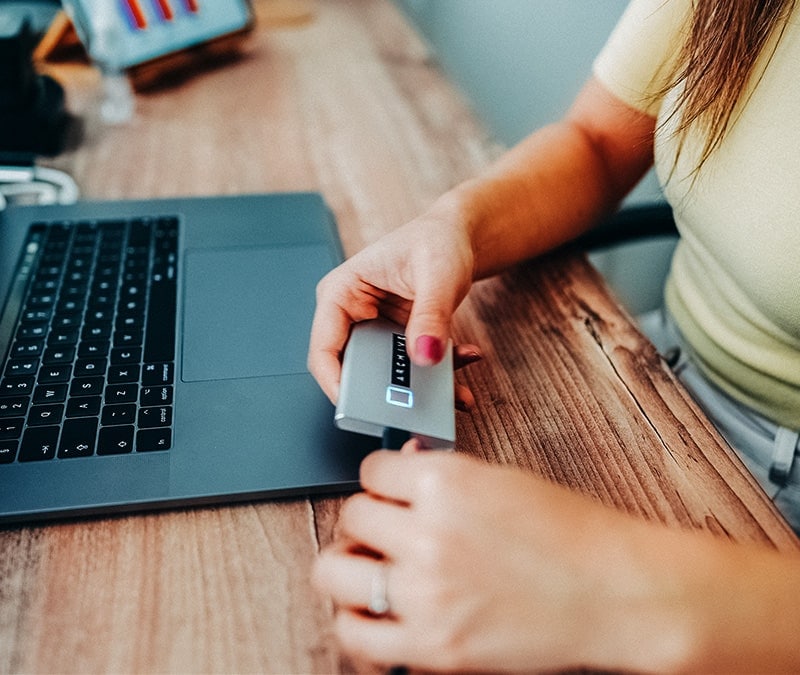Could your small business be a ransomware target?
Small business ransomware attacks aren’t just a big-business problem anymore. Here’s what to do to help keep your company Cyber Safe and how Norton Small Business can help protect all you’re working for.

Ransomware is a type of malware that locks your business's files or systems — like customer records, financial data, or email — and demands a ransom payment (usually in cryptocurrency) to restore access. And cybercriminals no longer just go after the big guys. These days, they see small businesses as easier targets: fewer IT resources, less security infrastructure, and just as much valuable data.
In fact, ransomware attacks saw an uptick of 37% in 2024 compared to 2023, and the costs can be high, affecting both your finances and your reputation.
Whether you run a small online shop or a freelance agency, your business could be vulnerable. So, how do you know if you’re at risk? And more importantly, how do you protect your business before it’s too late?
Let’s break it down.
Why would hackers bother with small businesses?
It’s easy to think cybercriminals only chase after corporate giants. Unfortunately, they’re not the type to pass up on any opportunities to scam or spread malware. Small businesses are prime real estate for ransomware attacks.
Think of it like this: big companies are like gated mansions with cameras and guards, while small businesses tend to be more like cozy homes with a back door that may accidentally be left unlocked. Inside are the valuables: customer data, sensitive business info, and critical financial records.
Ransomware groups have taken notice. With automated tools and phishing kits readily available, cyber attackers can cast a wide net and snare smaller targets without much effort. They deliver ransomware through tactics such as phishing emails, exploiting software vulnerabilities, or taking advantage of weak passwords. Once installed, the ransomware locks files and systems, holding them hostage until a ransom is paid.
5 signs your business might be at risk of a ransomware attack
You don’t want to be in a situation like this Reddit user who asked for direction on what to do after a small CPA firm was the target of a ransomware attack. Here’s what to look for and what you can do to help prevent attacks from affecting your business:
1. Frequent phishing emails
Emails that look like invoices, messages from the CEO, or package delivery updates are often fakes. One click on the wrong link and ransomware can spread across your network like wildfire.
Phishing is still one of the most popular cyberattacks. It makes sense, considering that with AI, cybercriminals can deploy multiple phishing emails that look legitimate.
2. Outdated software
Running on old software is like locking your front door, but leaving the window open. Cybercriminals actively hunt for systems missing critical updates or patches.
That includes:
- Operating systems past end-of-life (like Windows 7)
- Unpatched apps or plugins
- Expired antivirus or firewall software
Keeping everything updated is one of the simplest forms of ransomware protection for small businesses.
3. Weak passwords with no MFA
Reused or weak passwords may seem convenient, but they're far from safe. Cybercriminals use automated tools to crack passwords in minutes. And without multi-factor authentication (MFA), once they’re in, they’re in.
4. System slowdowns or errors
Ransomware doesn’t always attack immediately. Some variants lurk for days or weeks, slowly encrypting files or disabling backups.
If your devices feel slower than usual or crash unexpectedly, don’t ignore it. Unusual behavior could be ransomware preparing to strike.
5. Lack of employee cybersecurity training
Your team is your first line of defense. If they don’t know how to spot scams or report suspicious behavior, your business is wide open.
According to Mimecast, 95% of breaches are caused by human error. This is the sign you need to invest in some cybersecurity training for you and your employees.
How to lock down your data before hackers do
To help avoid ransomware and protect yourself and your company, perform regular backups, updates, and security patches, and use strong passwords. Here’s how to turn your small business into a digital fortress:
- Regularly back up your data: Use encrypted, off-site backups or secure cloud backups. Test them routinely.
- Use strong passwords and MFA: Use a password manager and mandate MFA for email, finance platforms, and cloud apps.
- Train employees for cybersecurity awareness: Start with phishing simulations and safe browsing basics, and go from there.
- Apply security patches ASAP: Enable auto-updates for all systems, apps, and plugins.
- Invest in cybersecurity solutions: Don’t rely on free antivirus software. Use full-featured solutions like Norton Small Business, which provides endpoint, malware, and ransomware protection.
- Segment your network: Keep sensitive business systems (like payments or customer data) separate from general browsing or email devices.
Defend against ransomware attacks with small business cybersecurity
No one wants their business threatened, yet there’s no guarantee it won’t be targeted. Protecting your business shouldn’t feel like another full-time job. Norton Small Business offers easy-to-manage tools to protect your data, devices, and employees from ransomware, malware, and phishing threats.
FAQs
What’s the first step if I suspect a ransomware attack?
If you suspect a ransomware attack, immediately disconnect the infected device from your network. Then, notify your IT provider or cybersecurity team and begin containment and recovery procedures.
Should I pay the ransom?
Experts and law enforcement strongly discourage paying ransomware. It fuels the ransomware economy, and there’s no guarantee you’ll regain access to your data. Focus on backups and response plans.
How much do ransomware attacks typically cost small businesses?
The cost of ransomware attacks can vary greatly and can also depend on the costs involved, such as lost productivity, customer churn, data recovery, and regulatory fines.
What should an incident response plan include?
A solid incident response plan should cover defined team roles, containment procedures, communication strategy, data recovery steps, and reporting protocols (law enforcement, customers, partners).
Editorial note: Our articles provide educational information for you. Our offerings may not cover or protect against every type of crime, fraud, or threat we write about. Our goal is to increase awareness about Cyber Safety. Please review complete Terms during enrollment or setup. Remember that no one can prevent all identity theft or cybercrime, and that LifeLock does not monitor all transactions at all businesses. The Norton and LifeLock brands are part of Gen Digital Inc.







Want more?
Follow us for all the latest news, tips, and updates.